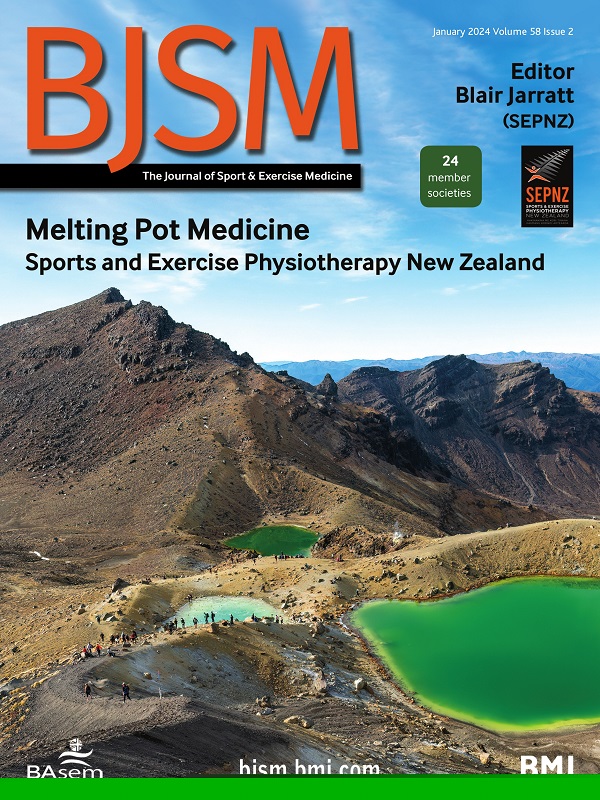Navigating preconception and pregnancy in elite athletes: insights from Australian elite female athletes, athlete support staff and sport organisational staff
IF 16.2
1区 医学
Q1 SPORT SCIENCES
引用次数: 0
Abstract
Objectives The primary objective of this study was to explore the experiences and beliefs of elite female athletes, athlete support staff and sport organisational staff regarding preconception and pregnancy in Australian elite athletes. Secondary objectives were to identify barriers and enablers encountered by elite athletes during preconception and pregnancy, and to use the study findings to develop recommendations to inform future pregnancy policies within sporting organisations. Methods 58 participants comprising 27 elite athletes, 20 support staff (eg, coaches, physicians, physiotherapists) and 11 sport organisational staff (eg, general managers, athlete well-being officers) from 25 sports participated in either a focus group (n=45) or semi-structured interview (n=13) conducted between 14 August 2023 and 21 November 2023. Focus groups and interviews were audio-recorded, transcribed verbatim and analysed using thematic analysis. Results The vast majority of athletes felt that organisational support for preconception and pregnancy was inadequate. Their feedback was categorised into four distinct themes: (1) planning, fertility and disclosure; (2) mindset; (3) training during preconception and pregnancy and (4) access to support and information. Within these themes, participants highlighted barriers (eg, lack of knowledge, impaired fertility, pregnancy symptoms) and opportunities for organisations to improve the current level of support provided (eg, education, fertility treatments, training flexibility). Overall, 22 recommendations were developed to guide Australian sporting organisations in future pregnancy policies. Conclusion Australian elite female athletes continue to face numerous barriers during preconception and pregnancy. Sporting organisations can use the findings and recommendations within this study to develop pregnancy policies, which better support female athletes. Data are available on reasonable request. The data that support the findings of this study are available on reasonable request.优秀运动员的孕前和怀孕:来自澳大利亚优秀女运动员、运动员支持人员和体育组织工作人员的见解
本研究的主要目的是探讨优秀女运动员、运动员支持人员和体育组织工作人员对澳大利亚优秀运动员孕前和怀孕的经验和看法。次要目标是确定精英运动员在孕前和怀孕期间遇到的障碍和促进因素,并利用研究结果制定建议,为体育组织未来的怀孕政策提供信息。方法在2023年8月14日至2023年11月21日期间,来自25个体育项目的27名优秀运动员、20名支持人员(如教练员、医生、物理治疗师)和11名体育组织人员(如总经理、运动员福利官)参与了焦点小组(n=45)或半结构化访谈(n=13)。对焦点小组和访谈进行录音,逐字抄录,并采用专题分析进行分析。结果绝大多数运动员认为组织对孕前和妊娠的支持不足。他们的反馈分为四个不同的主题:(1)计划、生育和披露;(2)思维方式;(3)孕前和怀孕期间的培训;(4)获得支持和信息。在这些主题中,与会者强调了障碍(例如,缺乏知识、生育力受损、怀孕症状)和各组织提高目前提供的支助水平的机会(例如,教育、生育治疗、培训灵活性)。总的来说,制定了22项建议,以指导澳大利亚体育组织未来的怀孕政策。结论:澳大利亚优秀女运动员在孕前和怀孕期间仍然面临许多障碍。体育组织可以利用这项研究的发现和建议来制定怀孕政策,更好地支持女运动员。如有合理要求,可提供资料。支持本研究结果的数据应合理要求提供。
本文章由计算机程序翻译,如有差异,请以英文原文为准。
求助全文
约1分钟内获得全文
求助全文
来源期刊
CiteScore
27.10
自引率
4.90%
发文量
217
审稿时长
3-8 weeks
期刊介绍:
The British Journal of Sports Medicine (BJSM) is a dynamic platform that presents groundbreaking research, thought-provoking reviews, and meaningful discussions on sport and exercise medicine. Our focus encompasses various clinically-relevant aspects such as physiotherapy, physical therapy, and rehabilitation. With an aim to foster innovation, education, and knowledge translation, we strive to bridge the gap between research and practical implementation in the field. Our multi-media approach, including web, print, video, and audio resources, along with our active presence on social media, connects a global community of healthcare professionals dedicated to treating active individuals.

 求助内容:
求助内容: 应助结果提醒方式:
应助结果提醒方式:


